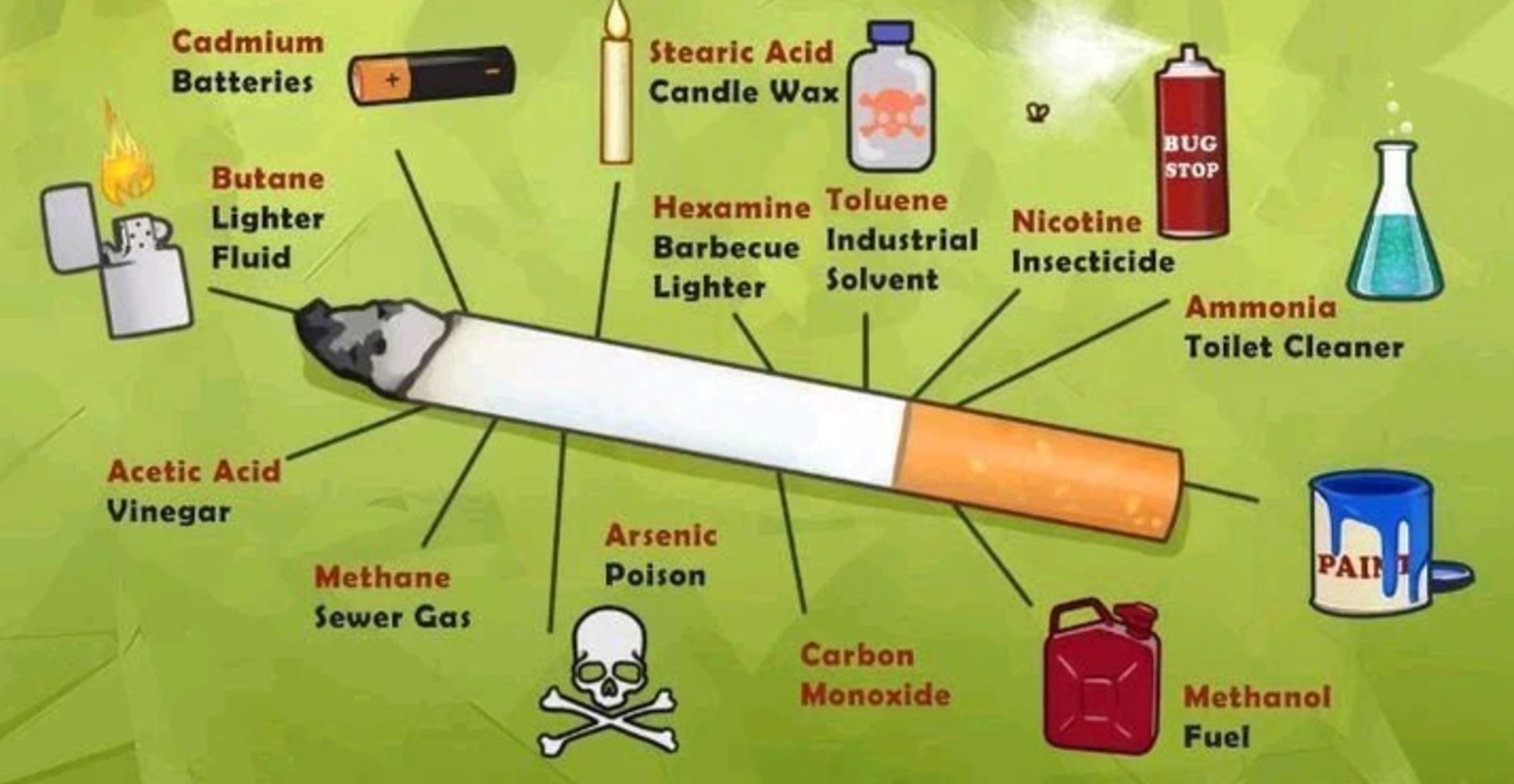When you smoke, whether it’s a cigarette, cigar, or other tobacco products, you are inhaling far more than just nicotine. While nicotine is the addictive substance in tobacco, the smoke produced from burning tobacco leaves contains a complex mixture of chemicals, many of which are toxic and harmful to the body. These substances can cause long-term damage to nearly every organ system, contributing to various chronic diseases and serious health conditions. Here’s what you are actually consuming every time you smoke:
1. Nicotine
Nicotine is the primary addictive component of tobacco smoke. It is a stimulant that affects the central nervous system, causing an increase in heart rate and blood pressure. Nicotine quickly enters the bloodstream when inhaled, reaching the brain within seconds, which leads to the feeling of pleasure and relaxation that smokers often associate with smoking. However, this also makes nicotine highly addictive, leading to cravings and withdrawal symptoms. Over time, nicotine use can cause dependence and make it difficult for smokers to quit…Click Here To Continue Reading>> …Click Here To Continue Reading>>
2. Tar
Tar is the sticky substance created when tobacco is burned. It consists of numerous toxic chemicals that can build up in the lungs, contributing to lung diseases such as chronic bronchitis and emphysema. Tar is also the primary cause of lung cancer, as it contains carcinogens (cancer-causing agents) that damage lung tissue over time. When you inhale cigarette smoke, the tar coats the lungs, hindering their ability to function properly and leading to long-term respiratory issues.
3. Carbon Monoxide
Carbon monoxide is a colorless, odorless gas that is produced when tobacco is burned. When inhaled, carbon monoxide binds to hemoglobin in the blood, reducing the amount of oxygen that can be carried to tissues and organs. This reduces oxygen levels in the body, making it harder for your organs to function efficiently. Over time, this lack of oxygen can contribute to cardiovascular diseases, including heart attacks and strokes.
4. Formaldehyde
Formaldehyde is a carcinogen and a potent irritant to the eyes, skin, and respiratory system. It is commonly used as a preservative and is released in cigarette smoke as a byproduct of combustion. Inhaling formaldehyde can cause irritation in the nose and throat, damage the lungs, and increase the risk of cancers of the respiratory system, particularly in the throat and lungs. Prolonged exposure can also contribute to developmental and reproductive toxicity.
5. Acetone
Acetone is a solvent commonly used in nail polish removers and is also present in cigarette smoke. While it is generally considered safe in small amounts, when inhaled in large quantities, acetone can irritate the eyes, nose, and throat. It can also cause dizziness, headaches, and nausea. Acetone exposure can damage the respiratory system over time and contribute to lung issues.
6. Ammonia READ FULL STORY HERE>>>CLICK HERE TO CONTINUE READING>>>
Ammonia is a chemical commonly used in cleaning products, but it’s also a byproduct of tobacco combustion. It is known to irritate the lungs and airways, causing coughing, shortness of breath, and wheezing. Ammonia can also make the body more susceptible to infections in the respiratory system and contributes to the formation of harmful toxins in the lungs. It also plays a role in increasing nicotine absorption, which enhances the addictive properties of smoking.
7. Hydrogen Cyanide
Hydrogen cyanide is another toxic chemical found in cigarette smoke. It is used in industrial processes, such as in the production of plastics and chemicals. When inhaled, hydrogen cyanide interferes with the body’s ability to use oxygen and can damage tissues and organs. It is particularly harmful to the cardiovascular and nervous systems, contributing to the development of heart disease and neurological disorders over time.
8. Benzene
Benzene is a known carcinogen and is present in cigarette smoke in significant quantities. It is linked to the development of leukemia and other blood cancers. Long-term exposure to benzene can also lead to damage to bone marrow, weakened immune function, and other severe health problems. It is absorbed into the bloodstream through the lungs, spreading throughout the body and causing widespread damage over time.
9. Cadmium
Cadmium is a heavy metal that is found in tobacco smoke and is known to accumulate in the kidneys and liver. It is a toxic substance that can cause kidney damage, osteoporosis, and damage to lung tissue. Chronic exposure to cadmium can increase the risk of lung cancer, cardiovascular disease, and other respiratory problems.
10. Other Toxic Chemicals
In addition to the aforementioned chemicals, cigarette smoke contains thousands of other substances, many of which are harmful to the body. These include chemicals like arsenic (a poison), lead, and polonium-210 (a radioactive element), all of which contribute to the toxicity of tobacco smoke. Together, these substances cause significant damage to the lungs, heart, blood vessels, and other organs, leading to a range of diseases, including cancer, respiratory disorders, and cardiovascular problems.
Conclusion
Every time you smoke, you are inhaling a cocktail of harmful chemicals that have serious consequences for your health. Nicotine is just the tip of the iceberg—alongside it, you’re consuming tar, carbon monoxide, formaldehyde, and a range of other toxic substances that can damage your lungs, heart, and other vital organs. Over time, this exposure leads to chronic diseases like lung cancer, heart disease, and respiratory disorders. Quitting smoking is one of the best things you can do for your health, allowing your body to recover and significantly reducing your risk of life-threatening conditions


 HEALTH & LIFESTYLE11 months ago
HEALTH & LIFESTYLE11 months ago
 METRO10 months ago
METRO10 months ago
 SPORTS11 months ago
SPORTS11 months ago
 SPORTS11 months ago
SPORTS11 months ago
 SPORTS8 months ago
SPORTS8 months ago


